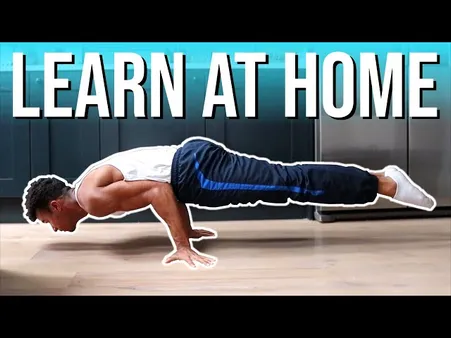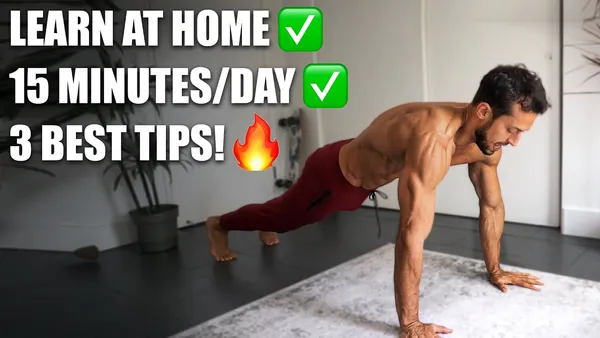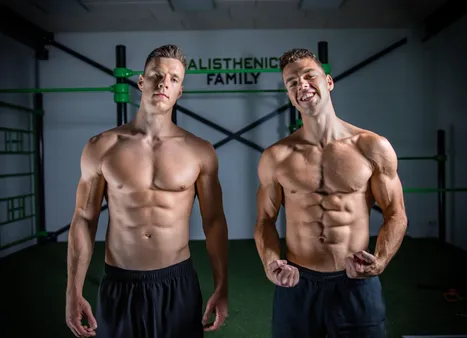Table of Contents
Calisthenics is a great way to get in shape without having to go to the gym. It's a form of exercise that uses your own body weight to build strength, flexibility, and endurance. If you're new to calisthenics, don't worry - it's easy to get started. In this article, we'll teach you everything you need to know about how to do calisthenics, from the basics to more advanced moves. So what are you waiting for? Get started today and see how quickly you can transform your body with calisthenics!
How to Do Calisthenics: A Comprehensive Guide to Bodyweight Training
Section | Key Takeaway |
|---|---|
Beginner's Basics | Start with bodyweight exercises like planks, squats, push-ups, and sit-ups. |
Bodyweight Mastery | Progress to more advanced exercises like pull-ups, dips, handstands, and muscle-ups. |
Upper Body Workout | Workouts for chest, back, shoulders, arms, including push-ups variations, pull-ups variations, dips variations, and rows variations. |
Lower Body Workout | Workouts for legs, glutes, and calves, including squats variations, lunges variations, and calf raises variations. |
Core Training | Workouts for abs, obliques, and lower back, including planks variations, crunches variations, and leg raises variations. |
Home Calisthenics | Exercises and tips for effective bodyweight training at home without equipment. |
Stretching and Recovery | Importance of stretching, foam rolling, and other recovery techniques for calisthenics. |
I. Calisthenics: A Comprehensive Guide to Getting Started
What is Calisthenics?
Calisthenics is a form of exercise that uses bodyweight as resistance. It is a great way to build strength, flexibility, and endurance. Calisthenics exercises can be done anywhere, making them a convenient and accessible form of exercise.
Benefits of Calisthenics
There are many benefits to doing calisthenics, including:
- Increased strength
- Improved flexibility
- Enhanced endurance
- Reduced risk of injury
- Improved body composition
- Increased self-confidence
Getting Started with Calisthenics
If you are new to calisthenics, it is important to start slowly and gradually increase the intensity of your workouts over time. Begin with basic exercises like push-ups, squats, and lunges. As you get stronger, you can add more challenging exercises to your routine.It is also important to listen to your body and rest when you need to. Do not push yourself too hard, especially when you are first starting out. If you experience any pain, stop exercising and consult with a doctor.
Tips for Calisthenics Beginners
Here are a few tips for calisthenics beginners:
- Start slowly and gradually increase the intensity of your workouts over time.
- Listen to your body and rest when you need to.
- Do not push yourself too hard, especially when you are first starting out.
- If you experience any pain, stop exercising and consult with a doctor.
- Find a workout buddy or join a calisthenics class for support and motivation.
- Have fun! Calisthenics is a great way to get in shape and have fun at the same time.
Related Posts
- How to Do a Muscle Up
- The Best Calisthenics Gifts and Accessories
- The Best Calisthenics Quotes and Motivation
Exercise | Difficulty | Equipment |
|---|---|---|
Push-ups | Beginner | Bodyweight |
Squats | Beginner | Bodyweight |
Lunges | Beginner | Bodyweight |
Pull-ups | Intermediate | Pull-up bar |
Dips | Intermediate | Dip bars |
Handstands | Advanced | Bodyweight |
Calisthenics: A Comprehensive Guide to Getting Started
II. Mastering Basic Calisthenics Exercises
Plank
The plank is a fundamental calisthenics exercise that engages your core and improves overall stability. Start by lying face down, then raise yourself onto your forearms and toes, keeping your body in a straight line from head to heels. Hold this position for as long as possible, maintaining proper form.
Push-Up
The push-up is another essential exercise that targets your chest, shoulders, and triceps. Start in a plank position, then lower your body by bending your elbows. Keep your elbows close to your body and lower yourself until your chest almost touches the ground. Push back up to the starting position, engaging your core and maintaining a straight body line.
Bodyweight Squat
The bodyweight squat is a compound exercise that works your legs, glutes, and core. Start with your feet shoulder-width apart, then lower your body by bending your knees and hips. Keep your back straight and chest up, and lower until your thighs are parallel to the ground. Push back up to the starting position, engaging your quads and glutes.
Bodyweight Lunge
The bodyweight lunge is a variation of the squat that focuses on one leg at a time. Start with your feet together, then step forward with one leg and bend both knees. Lower your body until your back knee is close to the ground, then push back up to the starting position. Repeat with the other leg.
Exercise | Benefits |
|---|---|
Plank | Strengthens core, improves posture |
Push-Up | Builds upper body strength, improves endurance |
Bodyweight Squat | Strengthens legs, glutes, improves mobility |
Bodyweight Lunge | Improves balance, flexibility, strengthens legs |
Pull-Up
The pull-up is a challenging but rewarding exercise that targets your back, biceps, and forearms. Start by hanging from a bar with an overhand grip, then pull yourself up until your chin is above the bar. Lower yourself back down to the starting position, controlling the movement throughout.
Dip
The dip is another advanced exercise that works your triceps, chest, and shoulders. Start by placing your hands on a parallel bar, then lower yourself by bending your elbows. Keep your body close to the bars and lower until your chest touches them. Push back up to the starting position, engaging your triceps and chest.
III. Advanced Calisthenics Techniques for Enhanced Strength
Weighted Calisthenics
Weighted calisthenics involves adding external weight to your bodyweight exercises, such as a weighted vest or ankle weights. This increases the resistance and challenges your muscles to work harder, leading to greater strength gains.
Isometric Calisthenics
Isometric calisthenics involves holding a static position for an extended period of time, such as a handstand or a wall sit. This type of training improves muscular endurance and strength, as well as core stability.
Exercise | Benefits |
|---|---|
Handstand | Improves shoulder strength, core stability, and balance |
Wall Sit | Strengthens the legs, glutes, and core |
Plyometric Calisthenics
Plyometric calisthenics involves explosive movements, such as jumping, hopping, and clapping. This type of training improves power, speed, and agility.
Advanced Calisthenics Techniques for Enhanced Strength
IV. Calisthenics Training Plan for Beginners
Getting Started with Calisthenics
Calisthenics is a great way to get in shape without any equipment. It's a bodyweight training method that uses exercises like push-ups, squats, and pull-ups to build strength, endurance, and flexibility. If you're new to calisthenics, start with the beginner exercises and gradually work your way up to more advanced moves.How to Get Started with Calisthenics as a Beginner
Beginner Calisthenics Exercises
Some beginner-friendly calisthenics exercises include:- Push-ups- Squats- Lunges- Plank- Pull-ups (assisted if needed)- Dips (assisted if needed)- Rows- CrunchesStart with a few sets of each exercise and gradually increase the number of sets and repetitions as you get stronger.
Exercise | Sets | Repetitions |
|---|---|---|
Push-ups | 3 | 10-15 |
Squats | 3 | 12-15 |
Lunges | 3 | 10-12 per leg |
Plank | 3 | Hold for 30-60 seconds |
Pull-ups (assisted) | 3 | 8-12 |
Dips (assisted) | 3 | 8-12 |
Rows | 3 | 10-15 |
Crunches | 3 | 15-20 |
Tips for Beginners
Here are a few tips for beginners:- Start slowly and gradually increase the intensity of your workouts.- Listen to your body and rest when you need to.- Focus on proper form to avoid injury.- Be patient and consistent with your training.How to Learn the Basic Calisthenics Skills and Progressions
Calisthenics Training Plan for Beginners
V. Conclusion
Calisthenics is a great way to get in shape and improve your overall health. It is a versatile form of exercise that can be done anywhere, anytime. With a little practice, you can master the basic calisthenics exercises and start to see results. So what are you waiting for? Get started today and see how calisthenics can change your life.